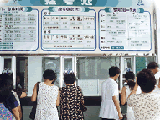 The Beijing Bureau of Health issued an emergency circular last Monday, asking patients to use their real names when registering for medical services.
The Beijing Bureau of Health issued an emergency circular last Monday, asking patients to use their real names when registering for medical services.
Under the new rule, a patient's name, ID number and address would be recorded with the diagnosis results.
This is only one of the recent moves by the authorities to bring the SARS epidemic under control.
Data collection and analysis could provide essential information for epidemic control and prevention. But untrue personal information provided by some SARS patients in past days has caused difficulties for the epidemiologic investigation and possible delay of treatment of other patients.
Disinformation also nullified medical professionals' efforts to track down and cut off all possible channels of infection.
The requirement for people to give their real names is not new. It has been in place in some cities or hospitals for a long time as a way to avoid abuse of medical welfare.
Until very recently, institutions in State sectors were the only places offering free or nearly-free medical services. There were cases that some people shared their State-financed medical accounts with others by allowing the latter to use their names. Checking the patients' identity cards has helped reduce such abuses.
Now, with SARS posing a threat to public health, the significance of using real information has become more prominent.
But in addition to the benefits from access to such information, the possible harm from improper use and disclosure of patients' personal information has also increased.
People are more aware of their individual rights and protection of privacy nowadays. Complaints and worries have been aired when people were asked to provide detailed personal information for using public transport such as planes and trains.
Media reports of SARS patients have also not helped. Disclosure of their personal information has ruined the daily lives of some patients who have recovered and their families to a degree.
Related departments should also work on privacy protection measures to ease such fears and make it easier for the practice of patients providing their real names to be implemented.
(China Daily June 5, 2003)
|

